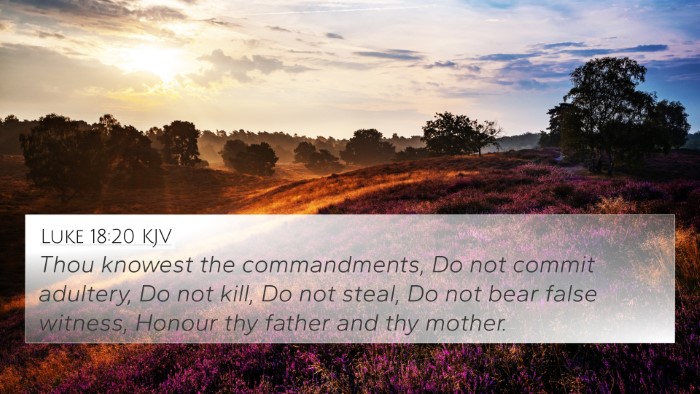Meaning and Interpretation of Deuteronomy 5:18
Deuteronomy 5:18 states: "Neither shalt thou commit adultery."
This commandment is part of the Ten Commandments, delivered by Moses to the Israelites as they prepared to enter the Promised Land. It emphasizes the sanctity of marriage and sexual purity.
Insights from Commentaries
The verse calls for fidelity in marital relationships, prohibiting any form of marital infidelity. Here, we summarize insights from several public domain commentaries:
-
Matthew Henry:
Henry emphasizes the moral foundation of this commandment, pointing out that God designed marriage to be a sacred union. Therefore, breaking this command is not just a social wrong but a spiritual violation against God's law.
-
Albert Barnes:
Barnes notes that this commandment affirms the importance of loyalty and commitment in relationships. It serves as a warning against the societal moral decay that can arise when individuals fail to honor their vows.
-
Adam Clarke:
Clarke describes the cultural and spiritual implications of adultery, stressing that it leads to familial breakdown and societal instability. He argues that the commandment aims to protect the family unit and promote communal harmony.
Bible Verse Cross-References
This commandment is interconnected with several other biblical texts that reinforce the themes of fidelity and the sanctity of marriage. Here are some cross-references related to Deuteronomy 5:18:
- Exodus 20:14 - "Thou shalt not commit adultery." (Reiterates the command)
- Matthew 5:27-28 - Jesus expands on the meaning of adultery, emphasizing that even lustful thoughts are a violation of this command.
- Hebrews 13:4 - "Marriage is honorable in all, and the bed undefiled: but whoremongers and adulterers God will judge."
- 1 Corinthians 6:9-10 - Describes the fate of those who practice adultery among other sins, highlighting consequences.
- Malachi 2:16 - "For the Lord, the God of Israel, says: 'I hate divorce...'" (God's disdain for marital unfaithfulness)
- Ephesians 5:25-33 - Describes the relationship between Christ and the church with parallels to the marriage covenant.
- Proverbs 6:32 - "But whoso committeth adultery with a woman lacketh understanding..." (Wisdom literature offering practical insight)
- James 4:4 - Describes friendship with the world as enmity against God, drawing parallels to spiritual adultery.
- Romans 7:2-3 - Discusses the binding nature of marriage and fidelity.
- 1 Thessalonians 4:3-5 - Urges believers to abstain from sexual immorality.
Understanding the Context
The context of this commandment in Deuteronomy is critical. The Israelites were transitioning into a new land and needed clear guidelines for a society that honors God. Adultery, as a betrayal of trust, not only harms individual relationships but can destroy the fabric of the community.
Connections Between Bible Verses
Deuteronomy 5:18 serves as a pivotal point for understanding the broader biblical narrative regarding relationships and morality. The connections drawn between this verse and others reveal a consistent theme of marital fidelity throughout scripture.
Tools for Bible Cross-Referencing
Exploring these connections requires effective tools for Bible cross-referencing:
- Bible Concordance: Look up keywords to find related verses.
- Bible Cross-Reference Guide: Resources that list verses according to themes.
- Cross-Reference Bible Study: Methods integrating multiple verses to deepen understanding.
Conclusion
In summary, Deuteronomy 5:18 is a crucial commandment rooted in the value of marital fidelity and sexual purity. Its interpretation spans various biblical teachings and serves to strengthen the moral framework within which individuals and communities should operate. By understanding this verse in the light of related scriptures, believers can gain a more profound comprehension of their responsibilities in relationships.
Further Study and Reflection
As you study Deuteronomy 5:18, consider how it applies to contemporary society. Reflect on the implications of fidelity in various relationships and how God's design for marriage can be honored today.
Utilizing the mentioned cross-references will provide depth to your understanding of this commandment, as well as its relevance throughout the Bible.








